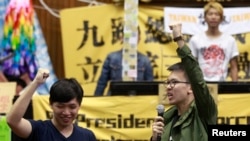TAIPEI —
Hundreds of students who have occupied Taiwan's parliament since March 18 are calling off their unusually aggressive protest. The decision to quit follows parliament speaker Wang Jin-pyng's promise Sunday to hold off on a contested China trade deal until an oversight bill is passed. He also pledged to later open legislative discussions on the trade deal.
Hsu An, a 21-year-old protester just off military duty, was among those occupying parliament's north gate.
He said he thinks the timing of the departure is just right. "We can't stay," Hsu explained, because Taiwan has a lot of things that need to pass legislative review, so to keep on occupying parliament is quite irrational. But he added that if there's another chance and he's directed by another protest leader, he would like to step out to demonstrate again.
Hsu's movement had demanded that parliament drop the fast-track ratification of a trade pact with China. The occupation later escalated with the break-in of Taiwan's cabinet offices and a 300,000-strong street demonstration. Protesters were then asking President Ma Ying-jeou to scrap and redo the pact in a more transparent way. Negotiators had signed the deal in June.
China claims sovereignty over self-ruled Taiwan and has threatened military force to bring the two sides together. Some in Taiwan fear China will use trade deals to lure the island into reunification. Since Ma took office in 2008, his government has signed 20 agreements with China to bolster Taiwan's economy. Officials say the service trade pact will lift Taiwan's vast service sector, including banks and healthcare.
The protest has prompted cabinet officials to review the way they communicate with the public. The premier's spokesman Sun Lih-chyun told a news conference the government did not initially grasp what protesters wanted and then acted too late to influence them.
Sun thinks a big problem arose from the way the government communicates with its friends. Sun says there was an obvious underestimation and that leaders also failed to grasp the timing. He added that once the big problem was discovered, the government could not get itself on track.
Protesters leaving parliament Thursday in their signature black shirts, a symbol of poor transparency, and bearing sunflowers signaled they will stay politically active. Some may give public speeches or hold forums to challenge trade relations with China while others draft plans for a mass street demonstration.
Hsu An, a 21-year-old protester just off military duty, was among those occupying parliament's north gate.
He said he thinks the timing of the departure is just right. "We can't stay," Hsu explained, because Taiwan has a lot of things that need to pass legislative review, so to keep on occupying parliament is quite irrational. But he added that if there's another chance and he's directed by another protest leader, he would like to step out to demonstrate again.
Hsu's movement had demanded that parliament drop the fast-track ratification of a trade pact with China. The occupation later escalated with the break-in of Taiwan's cabinet offices and a 300,000-strong street demonstration. Protesters were then asking President Ma Ying-jeou to scrap and redo the pact in a more transparent way. Negotiators had signed the deal in June.
China claims sovereignty over self-ruled Taiwan and has threatened military force to bring the two sides together. Some in Taiwan fear China will use trade deals to lure the island into reunification. Since Ma took office in 2008, his government has signed 20 agreements with China to bolster Taiwan's economy. Officials say the service trade pact will lift Taiwan's vast service sector, including banks and healthcare.
The protest has prompted cabinet officials to review the way they communicate with the public. The premier's spokesman Sun Lih-chyun told a news conference the government did not initially grasp what protesters wanted and then acted too late to influence them.
Sun thinks a big problem arose from the way the government communicates with its friends. Sun says there was an obvious underestimation and that leaders also failed to grasp the timing. He added that once the big problem was discovered, the government could not get itself on track.
Protesters leaving parliament Thursday in their signature black shirts, a symbol of poor transparency, and bearing sunflowers signaled they will stay politically active. Some may give public speeches or hold forums to challenge trade relations with China while others draft plans for a mass street demonstration.




